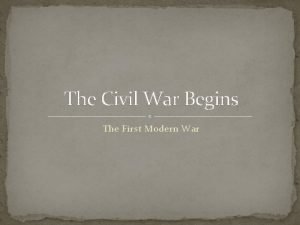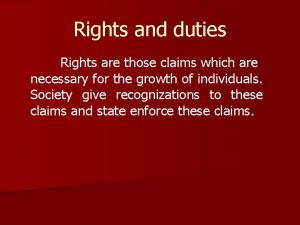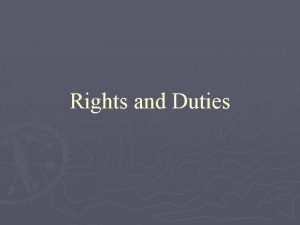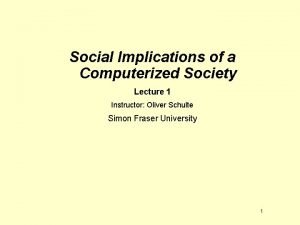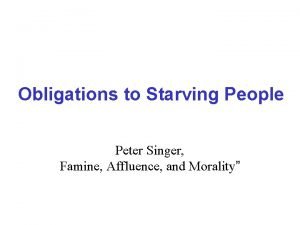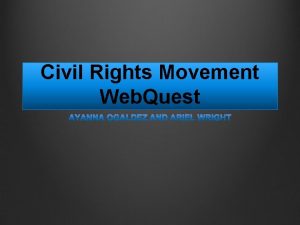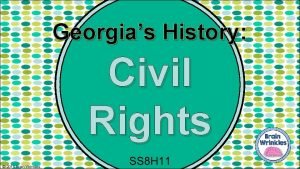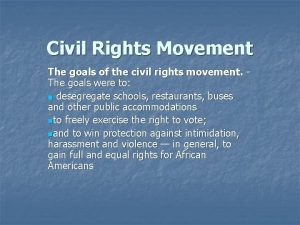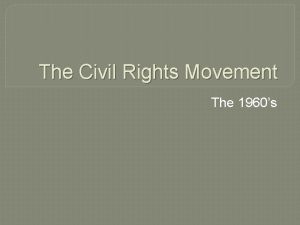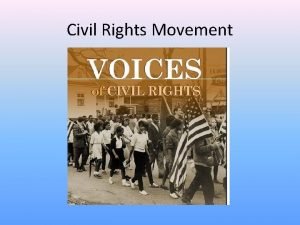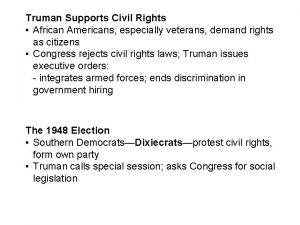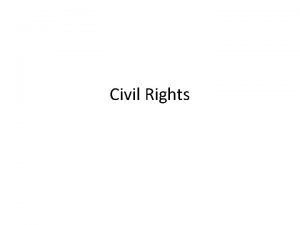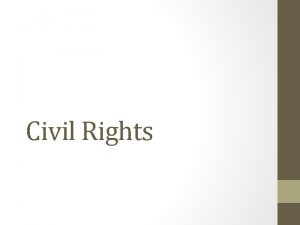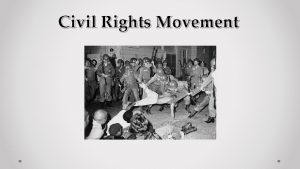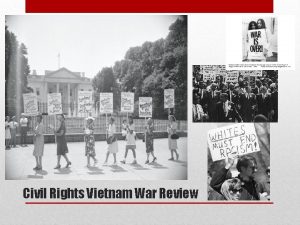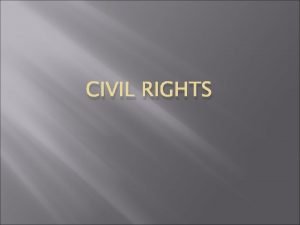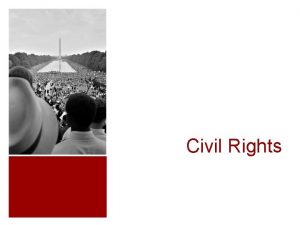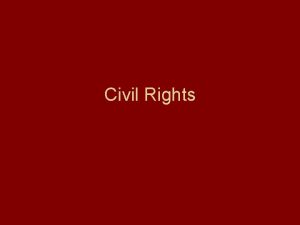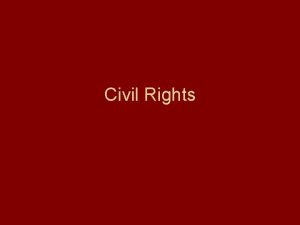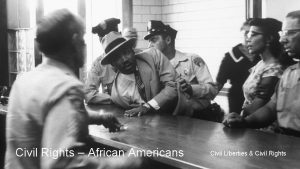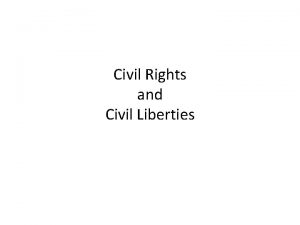Civil War to Civil Rights Although neither was


























- Slides: 26

Civil War to Civil Rights • Although neither was very “civil” they both were hard fought “battles”. • This is a brief look at why African American rights took so long to materialize. • We will examine some Supreme Court cases and Constitutional Amendments that made it difficult for African Americans.

Civil War to Civil Rights • Dred Scott v. Sandford: 1857 • Dred Scott was a slave who traveled to free states with his owner. • Since he set foot on free land, Dred Scott argued that he was a free man. • Supreme Court ruled that Scott was “property” and that his owner had complete control over his destiny.


Civil War to Civil Rights • Supreme Court also ruled that since Scott wasn’t a citizen of the U. S. he couldn’t sue. • Civil War – 1861 – 1865 • Emancipation Proclamation – 1863: • Changed the attitude of the Civil War – became a crusade against slavery.

Civil War to Civil Rights • Reduced the likelihood of Great Britain helping the South – Great Britain was against slavery. • Never freed any slaves – merely changed the attitude of the war for the Union.

Civil War to Civil Rights • • • 13 th Amendment – 1865: Ended Slavery 14 th Amendment – 1868: Defined citizenship 15 th Amendment – 1870: Gave African American males the right to vote.

Civil War to Civil Rights • Reconstruction – 1863 – 1877: • Attempt by the North to make the South comply with federal rules regarding African Americans. • The South was carved up into military districts headed by the North.

Civil War to Civil Rights • Growth of groups such as the Ku Klux Klan showed southern opposition to African American equality. • Hard to change a “culture” in just few years.


Civil War to Civil Rights • Compromise of 1877: • In the election of 1876 Rutherford B. Hayes “R” lost the popular vote to Samuel Tilden “D”. • A special commission was established to resolve any voting discrepancy.


Civil War to Civil Rights • Rutherford B Hayes said that if he were elected president he would remove all federal troops from the South. • Democrats accepted this compromise and Hayes became president. • Southern democrats regained control of the “South”.

Civil War to Civil Rights • With the Compromise of 1877, reconstruction ended and African Americans gained little. • Plessy v. Ferguson – 1896: • Homer Plessy was 1/8 th Black and tried to ride a “White” train. Plessy was arrested and the case went to the Supreme Court.


Civil War to Civil Rights • The Supreme Court ruled that “Separate Facilities are Equal”. • This ruling solidified discrimination – as long as you had two separate trains, schools, restaurants, etc… it was legal to discriminate.

Civil War to Civil Rights • Brown v. Board of Education of Topeka, Kansas – 1954: • Oliver Brown argued that his daughter Linda should be able to attend the “White” school that was located close to their home. • By law Linda had to go the “Black” school which was further from the home.


Civil War to Civil Rights • Supreme Court ruled that “Separate Facilities are Unequal”. • The process of Desegregation had begun. • Montgomery Bus Boycott – 1955: • Rosa Parks refused to give her seat on a bus to a white man.


Civil War to Civil Rights • Rosa Parks was arrested – Civil Rights started to gain a lot of momentum after this event. • This is the introduction of Martin Luther King Jr. to the Civil Rights movement. • African Americans boycotted the busing system in Montgomery for over a year.

Civil War to Civil Rights • The federal government finally ruled that busing, like schools had to be Desegregated. • March on Washington – 1963: • African Americans wanted JFK to pass Civil Rights legislation to guarantee equality.

Civil War to Civil Rights • Thousands gathered in Wash. D. C. to hear MLK Jr. give his “I have a dream speech”. • JFK was assassinated a few months later and the torch was passed to LBJ, who got the Civil Rights Act of 1964 passed.


Civil War to Civil Rights • Civil Rights Act – 1964: • Outlawed discrimination in public places. • 24 th Amendment – 1964: • Made it illegal to charge a “poll tax” to vote.

Civil War to Civil Rights • The 15 th amendment gave African American males the right to vote and the 19 th amendment gave all women the right to vote. • Southern states would charge a “poll tax” before African Americans could vote.

Civil War to Civil Rights • Were the southern states violating the 15 th or 19 th amendments? • They would let African Americans vote if they could pay the tax. • The 24 th amendment made sure that African Americans were treated fairly when it came to voting – ninety four years after the guarantee to vote.
 Civil rights and civil liberties webquest
Civil rights and civil liberties webquest Neither nor or neither or
Neither nor or neither or Why was the civil war considered the first modern war
Why was the civil war considered the first modern war Toward civil war lesson 3 secession and war
Toward civil war lesson 3 secession and war Negative right
Negative right Legal rights and moral rights
Legal rights and moral rights Rosalind hursthouse
Rosalind hursthouse Legal rights and moral rights
Legal rights and moral rights Negative right
Negative right Positive rights and negative rights
Positive rights and negative rights What are negative rights
What are negative rights Littoral rights vs riparian rights
Littoral rights vs riparian rights Civil rights movement webquest
Civil rights movement webquest Civil rights bell ringers
Civil rights bell ringers Civil rights cloze notes 1
Civil rights cloze notes 1 Civil rights movement goal
Civil rights movement goal Civil rights movement essential questions
Civil rights movement essential questions Title vii of the civil rights act
Title vii of the civil rights act Civil rights in child nutrition programs
Civil rights in child nutrition programs Civil rights sitins
Civil rights sitins Civil rights choice board
Civil rights choice board Unit 7: modern ga and civil rights
Unit 7: modern ga and civil rights Chapter 20 civil liberties protecting individual rights
Chapter 20 civil liberties protecting individual rights Civil rights movment
Civil rights movment Truman supports civil rights
Truman supports civil rights Brain wrinkles answer key
Brain wrinkles answer key Civil rights in child nutrition programs
Civil rights in child nutrition programs


